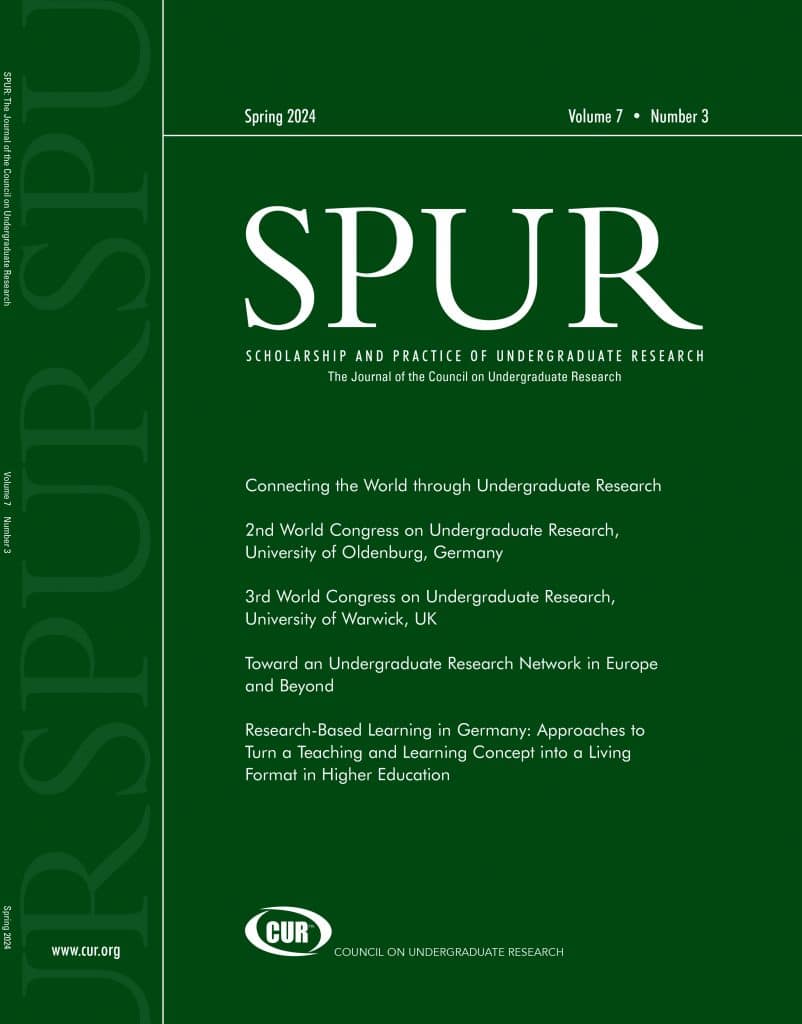SPUR (2024) 7 (3): https://doi.org/10.18833/spur/7/3/8
The 2nd World Congress on Undergraduate Research, held at the University of Oldenburg, Germany, May 23-25, 2019, aimed to foster global dialogue across diverse research disciplines. It brought together exceptional undergraduate researchers to collaborate on pressing international challenges of the 21st century. The event featured six interdisciplinary themes that allowed students to present and discuss their research in lectures and poster sessions, and was framed by a two-day social program. In total, 467 participants from 35 countries and 98 universities presented their work. More than 60 students from low-income countries benefited from travel grants and the “beds for brains” program which organized private accommodations. This article outlines the concepts, organizational challenges, and evaluation results of the congress.
Recommended Citation: Bugiacca, Vanessa Barbagiovanni, Annalena Karweik, Susanne Haberstroh. 2024. 2nd World Congress on Undergraduate Research, University of Oldenburg, Germany. Scholarship and Practice of Undergraduate Research 7 (3): 17-25. https://doi.org/10.18833/spur/7/3/8
Following the successful inaugural World Congress on Undergraduate Research (WorldCUR) in Doha, Qatar in November 2016, the second iteration of the World Congress took place at the Carl von Ossietzky University of Oldenburg in 2019. Located in the Northwest of Germany, the University of Oldenburg was founded in 1973, making it one of the younger higher education institutions in Germany. It has around 16,000 students and offers a wide range of study programs, providing students with a variety of options for their academic pursuits. (University of Oldenburg n.d.b)
A key goal of the university is the seamless integration of research and teaching, a commitment that is prominently featured in its mission statement, emphasizing the importance of research-based learning in academic education.
The organizers of the 1st WorldCUR chose the University of Oldenburg because of its established focus on undergraduate research and its experience in hosting student conferences, without a formal application process for the 2nd WorldCUR. In addition, the size of the University of Oldenburg and Germany’s reputation as a safe environment for international students, as well as the university’s participation in the 1st WorldCUR in Doha, made it an ideal choice.
From May 23 to 25 in 2019, the University of Oldenburg welcomed well over four hundred international students and scholars who came together to celebrate undergraduate research, foster the exchange of ideas on pressing global issues of the 21st century, and cultivate professional networks. The event focused on the presentation of student research within six overarching themes.
The primary goal of the congress was to bring together students of different nationalities and research disciplines, and to harness this diversity as a collective force to address global challenges by fostering worldwide networks and jointly exploring and discussing ideas for solutions. This aligns with the findings of several studies that highlight the benefits of undergraduate research conference participation, including skill development and enhanced academic and professional growth. (Chris 2020; Hill, and Kneale 2017; Hill and Walkington, 2016; Kneale et al., 2016; Mabrouk 2009). These studies consistently affirm that undergraduate research conferences are key to increasing student engagement, providing active immersion in their fields of study, and strengthening connections within their academic and professional communities. In addition to the scholarly dissemination of diverse academic endeavors through oral presentations and poster presentations, the organizing committee curated a variety of exchange and networking opportunities throughout the congress to ensure an enriching experience for all participants. These activities included a carefully planned two-day social program with excursions to various venues in both northern Germany and the Netherlands. In addition, faculty members and coordinators were provided with numerous opportunities to engage, network, and showcase their respective academic institutions.
Recognizing the importance of ensuring broad participation by students from around the world, extensive support initiatives, both financial and otherwise like the travel grants and the “beds for brains” program, were initiated in a timely manner. The significant investment of energy and time in these efforts proved successful, enabling numerous students from low-income countries to attend the congress.
Setting the Stage: Preparing for the 2019 World Congress of Undergraduate Research
Preparing for the World Congress of Undergraduate Research was an extensive undertaking spanning 26 months from the university’s decision to host the event to the event itself. The core team based in the Presidential Department for Study Affairs, consisting of chair and chief organizer, had primary responsibility for the congress and most of its areas. In the last six months before the congress, four highly involved staff members joined the core team, supported by additional staff members.
The student team consisted of nine senior students who were recruited two years prior to the congress to allow high involvement and the development of expertise. These seniors were specifically recruited for and given responsibility in the areas of public relations, travel support, room planning, social program, and tools & technology. They also formed the Student Congress Committee representing student interests throughout the development and preparation process. Finally, just before the event, the seniors helped to recruit and train another 20 “junior” students to help run the congress. These junior students were involved in various activities during the congress, such as monitoring and coordinating procedures, assisting attendees at the registration desk, serving as guides during the social program, and helping to prepare sessions.
The committee of the 2nd World Congress on Undergraduate Research consisted of partners from the Council on Undergraduate Research (CUR), the British Conference of Undergraduate Research, the Australasian Conference of Undergraduate Research, and the previous host institution (Qatar University). The committee was involved in all major decisions regarding the planning of the congress and coordinated arrangements for the organization, schedule, and promotional activities, which was very helpful for the success of the event. At the congress in Oldenburg, the host University of Oldenburg congress leadership and these partners founded the “Alliance on Global Undergraduate Research,” which aims to promote undergraduate research worldwide and support future hosts of the WorldCUR.
The Call for Participation emphasized the importance of interdisciplinary dialogue by inviting undergraduate students to submit research papers and creative works from a wide range of disciplines in the sciences, humanities, and social sciences. Submissions were called for according to six overarching research themes, which were intensively discussed and agreed upon by the Congress Committee. These were similar, but not identical, to the themes chosen at the Doha Congress. The research themes were complemented by visual branding developed in-house by a member of the core team and a media designer from the department for press and communication. The key visuals included not only the individual research theme icons (see Figure 1) colored in different shades of blue to match the university’s corporate design, but also the logo for the 2nd WorldCUR (see University of Oldenburg. n.d.c). These images were used across all print media, the website, social media channels, and various merchandise products.
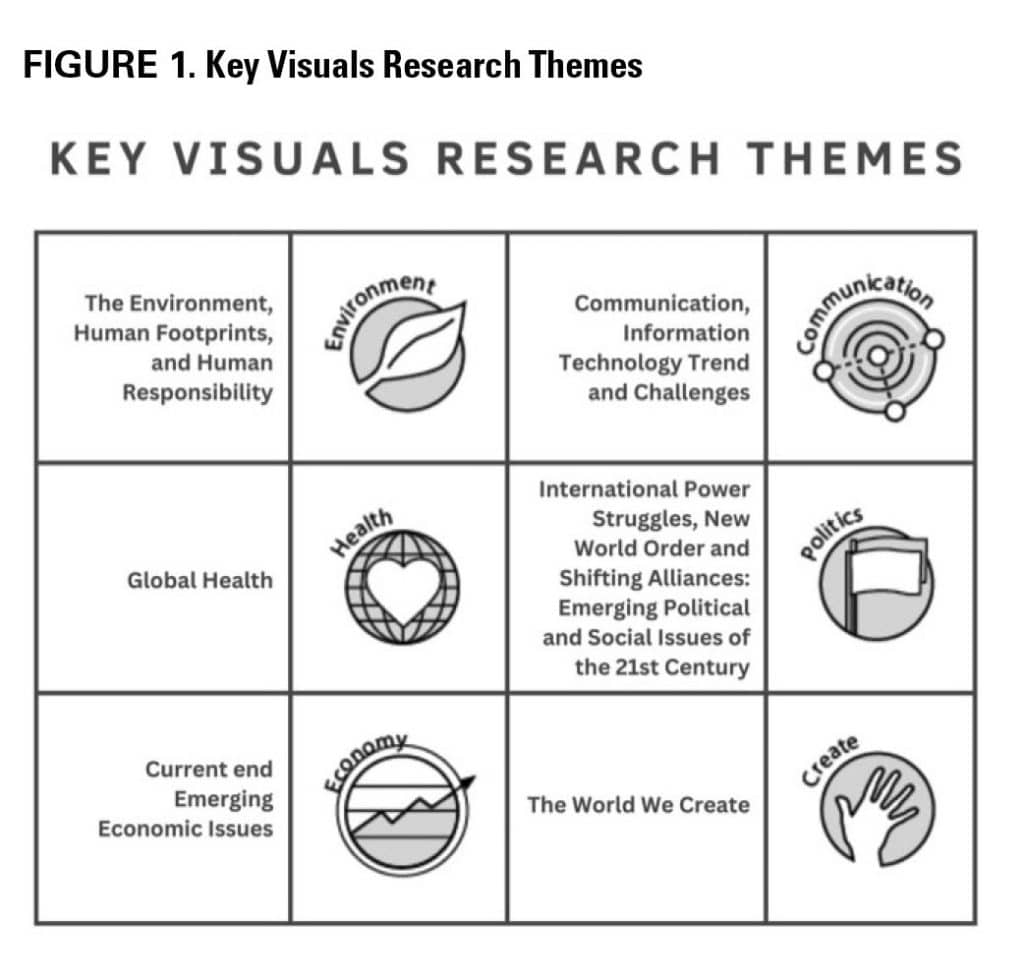
The international nature of the Congress was evident in the review process, where 400 submissions were reviewed by an international panel of experts from various disciplines. Each submission was reviewed by an expert and a non-specialist in the respective discipline to ensure both scholarly accuracy and accessibility to a wider audience.
The World Congress on Undergraduate Research: An Enriching and Diverse Experience
From May 23 to 25 2019, 467 guests from 98 universities and institutions were welcomed to the main campus of the University of Oldenburg at the Auditorium Center, where the congress took place. More specifically, the participants comprised 252 student presenters; 59 supervisors, coordinators, and faculty members; 97 guests, either students or faculty; and 13 special guests, i.e., representatives, committee, keynote speakers, and the host; as well as the 46 members of the organizing team, including 29 students. Students came from 35 countries and all continents except Antarctica.
The World Congress program was designed to provide a platform for presenting student research and facilitating professional exchange, while allowing ample time for networking and exploring the northwestern region of Germany. The program consisted of several components designed to meet the diverse needs and interests of participants. During the congress days, 215 presentations – 133 oral presentations and 82 posters – were given on the six research themes environment, global health, economy, communication, politics, and the world we create (see Figure 2). More than 100 academic disciplines were represented. (University of Oldenburg. 2019c).
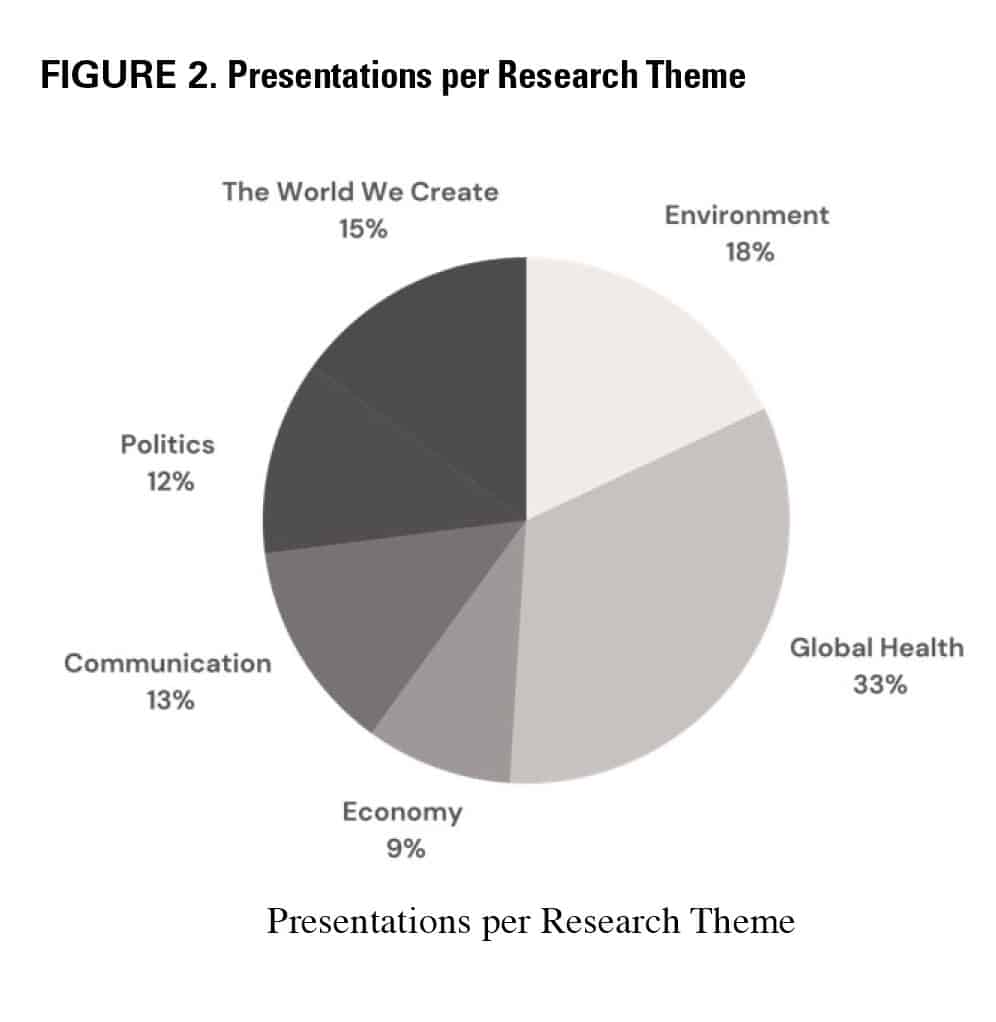
The World Congress officially began with an opening ceremony, that featured for the first time the passing of the baton from the previous organizer, Qatar University, to the University of Oldenburg. The baton, engraved with the hosts of the first and second World Congresses, symbolized the continuity and collective effort of the global undergraduate research community.
Following the opening ceremony, Dr. Lujendra Ojha from John Hopkins University, United States, delivered an insightful keynote speech, “Grand Challenges Related to Resources Scarcity in the Future: Synopsis, Solutions, and Undergraduate Involvement” addressing an important future challenge. The second day, Dr. Sonia Fizek from Abertay University, United Kingdom, and Dr. Anne Dippel from the University of Jena, Germany, engaged the audience with their inspiring keynote, “Playful Research by Design: Why the World Needs Thinkers, Tinkerers, and Team Players.” Both keynotes were filmed and provided via the congress YouTube channel (WorldCUR 2019).
The centerpiece of the congress program were the student presentations focused on the six research themes delivered in panel, poster, and thematic sessions: First, each session of oral presentations featured three thematically complementary presentations which were followed by a dedicated 15-minute period for the audience to engage in discussion and direct questions to the presenters. At each session a faculty member (discussant) was present to provide a summary of the findings and contextualize them within the broader research landscape. Each oral session lasted 90 minutes, ensuring a comprehensive exploration of the research topics. In total there were 46 panel session containing 133 oral presentations.
In the two poster sessions, up to 40 students presented their research. These one-hour sessions created an atmosphere conducive to lively discussion and knowledge sharing.
At the conclusion of the congress, awards were distributed to recognize the exceptional quality of contributions across various research themes, applicable to both poster and oral presentations. Award winners came from Uganda, Argentina, Germany, Qatar, and the United States. The award selection was overseen by the six juries each consisting of three different members, including a faculty member, a student, and a committee member, ensuring a comprehensive evaluation from multiple perspectives. Up to five entries per theme were shortlisted based on stringent criteria outlined in the event’s rating scheme, encompassing relevance, theoretical depth, methodological soundness, understandability, clarity, presentation effectiveness, and audience engagement. These entries underwent an anonymous review by the juries to avoid bias and focus solely on content quality. Winners received a wooden trophy and 500€ funded by a regional foundation.
The thematic sessions were a highlight of the congress each with approximately 15 to 25 participants, providing a valuable platform for students to exchange ideas, engage in discussions, and foster collaborative projects. The sessions were announced and advertised prior to the congress but only open to student presenters. They were divided into groups based on their research interests, so that in total there were eight sessions, organized around the six research themes. The thematic sessions were hosted as well as facilitated by university teachers of the host institution. The results of these sessions were later shared via social media and presented at the closing ceremony, allowing all participants to benefit from the collective knowledge and insights generated.
Furthermore, undergraduate research coordinators and supervisors who accompanied the student presenters, were given the opportunity to share results, experiences and programs related to undergraduate research in a poster session with 20 posters dedicated to faculty and coordinators. The aim of this session was to promote international collaboration between colleagues who are involved in UR at their respective institutions worldwide.
At the Graduate Fair students could explore different Master’s programs offered by universities around the world.
The official program of the World Congress on Undergraduate Research concluded with a festive closing ceremony on May 25th, during which the previous days of the congress were reviewed by viewing video footage, closely examining and commenting on the graphic recordings of the thematic sessions, presenting awards for outstanding presentations, and honoring all those involved in the organization of the congress.
Social Program – Bringing People Together
In addition to focusing on intellectual endeavors, the Congress offered a social program that facilitated socializing opportunities, introduced participants to the cultural heritage of Northwest Germany and the Netherlands, and framed the official congress program. The social program included several pre- and post-conference tours and events that allowed participants to explore the region’s attractions. Excursions to Bremen, Groningen (Netherlands) and Papenburg (shipyard visit) provided insightful glimpses into the local culture. Furthermore, numerous tours within the city of Oldenburg, developed by both the student team and the city’s tourism office, provided opportunities for informal networking. Other informal networking opportunities, such as the Welcome Snack and Get Together, a mirror photo booth, called the Magic Networking Machine, and a Gallery for the photos taken, were organized over the course of the event. The World Congress concluded on a celebratory note with a grand party on the evening of May 25th, themed “98 Universities – one party.”
Through the social program, the Congress not only facilitated the dissemination of undergraduate research and interdisciplinary collaboration, but also fostered networking and cultural exploration.
Developing the World Congress on Undergraduate Research
The growing recognition of undergraduate research worldwide and the expanding importance of interdisciplinary and cross-cultural exchange of ideas were exemplified by the increased size and global participation at the 2nd World Congress compared to the inaugural edition in Doha which attracted about 200 participants from higher education institutions in 11 countries (Australia, United States, Europe, the Gulf region and the Middle Ease) (Rivera et al. 2018, 55). In this second edition, the congress grew significantly in the number of students and countries involved.
Another innovation of the conference was the introduction of support programs specifically aimed at facilitating the participation of students from low-income countries providing financial support. These programs played a crucial role in ensuring inclusivity and giving opportunities to students who otherwise would not have been able to attend. The Travel Support Program, supported by the University of Oldenburg and the Ministry for Science and Culture of Lower Saxony, enabled 60 students from low and middle-income countries to attend the conference by covering their transportation costs and congress fee. In this context a challenge was the timely issuance of travel visas, even with a travel grant. Not all participants who received a travel grant were able to attend the congress due to varying visa processing times.
Through the “Beds for Brains” program, in which students and faculty members from the University of Oldenburg offered free lodging to visiting participants were provided with free accommodation, strengthening intercultural connections, and promoting a sense of community. The university itself does not have any residences of its own, so that attendees had to stay in a hotel or other accommodation through the Tourism and Marketing Department of the City of Oldenburg, which had made a contingent of rooms available for this purpose, participants were able to book rooms at special rates. This information was communicated via various channels and was permanently available on the website (University of Oldenburg n.d.d).
For the first time students played a pivotal role in the development and organization of the World Congress, taking responsibility for various aspects of the program, including the social program. Their active involvement demonstrated the commitment and dedication of the student community in shaping and contributing to the success of the WorldCUR 2019.
To ensure comprehensive documentation, 19 video interviews were conducted with congress attendees to capture their perspectives and experiences during WorldCUR 2019. These interviews and other footage from the congress were compiled into a film (WorldCUR 2019b), providing a valuable record of the congress atmosphere, and further enriching the documentation process.
In addition, the event was supported and accompanied by a graphic recorder. Her drawings provide a unique form of documentation (for a detailed view of all graphic recordings see University of Oldenburg n.d.a). The graphic recorder attended several sessions for each research theme and captured the essence of the discussions and presentations on a large canvas in real time. These visuals were made available online. An animated version of the graphic recordings can be viewed on the 2nd World Congress YouTube channel, along with the other video content of the congress (WorldCUR2019 n.d).
Completing the Research Cycle – the Subsequent Publication
After the congress, participants had the opportunity to contribute to a special issue of “forsch!”, the Online Student Journal of the University of Oldenburg (Haberstroh and Bernhold 2021). Since its launch in 2015, this open-access online journal has served as a platform for students at the University of Oldenburg to publish their research findings.
Accepted submission formats included several options: research papers, research proposals, research posters accompanied by explanatory text, and experimental formats such as films or blogs paired with supporting text. Each submitted paper underwent an initial review and was then forwarded to subject experts for a more comprehensive review. A notable challenge was finding appropriate reviewers who were willing to take on the task. In addition to the student papers, the issue also includes reports from each session of the congress, mostly written by sessions discussants. This not only enabled the students to experience a complete research cycle culminating in publication, but also ensured thorough documentation of the congress sessions, thereby fostering accessibility and transparency.
Evaluation Results and Participant Feedback
The evaluation results and participant feedback from the 2nd World Congress on Undergraduate Research shed light on various aspects of the event such as organizational matters, the congress program, activities, and resources, as well as the personal experience (University of Oldenburg 2019d). Participants were also given the opportunity to provide unsolicited comments and suggestions. A total of 100 attendees participated, and the overall evaluation results were very positive, indicating a remarkable level of satisfaction among attendees.
An overwhelming 97 percent agreed/fully agreed that the team was always available for questions and support, indicating effective and responsive support throughout the event. In addition, all respondents agreed that the team was approachable, friendly, and willing to help, demonstrating the welcoming and supportive environment created by the organizers.
Evaluation of the Congress program, activities, and resources revealed generally positive responses (see Figure 3), with notable satisfaction levels for printed materials such as the congress booklet (99 percent) and the abstract book (93 percent). The congress booklet contained not only the congress schedule in detail, but also a lot of information about different aspects of the program and other useful information for participants (University of Oldenburg 2019b) while the abstract book featured abstracts of all presentations (University of Oldenburg 2019a). The congress website and the social media channels, including Facebook, Twitter and Instagram, were each rated as valuable/very valuable by 85 percent of attendees. A great deal of information was provided via social media prior to the congress, and these channels were an important means of communication during the event as well. Networking was supported by various measures, such as the Magic Networking Machine, and were considered valuable/very valuable by 79 percent. It was not only a way to capture memories in the form of images but was also used as a form of social networking and enjoyment at the conference.
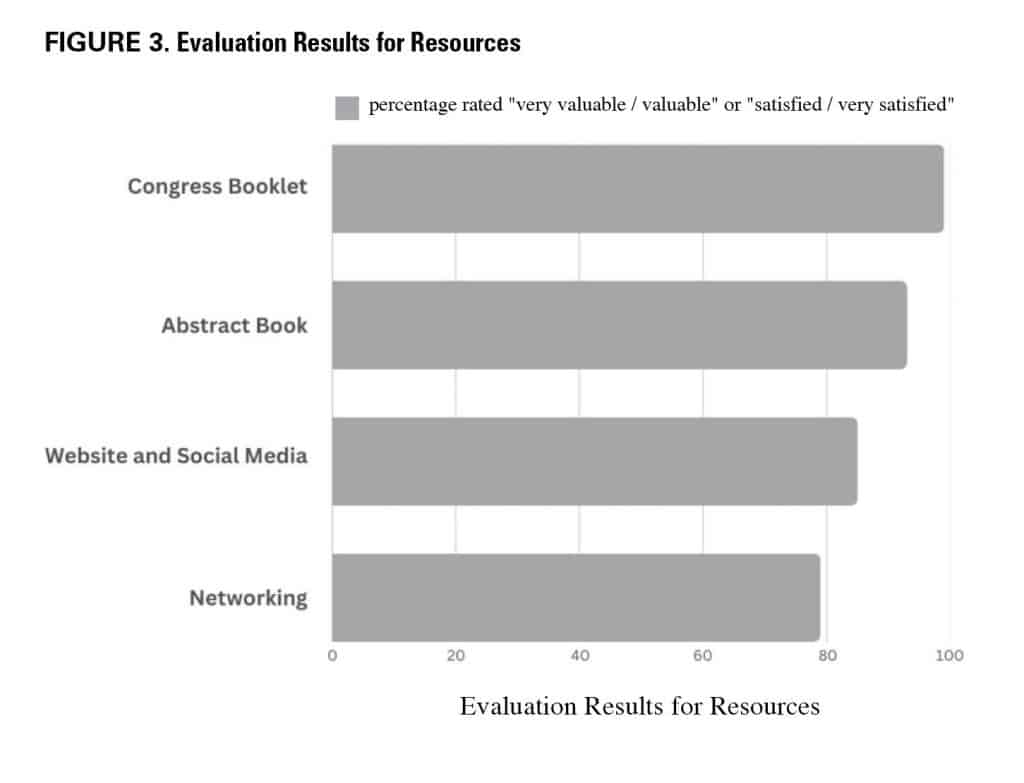
In terms of funding, participants reported various sources of support (see Figure 4) for their congress attendance. The majority of respondents (51) received financial support from their home university or institution, while 29 student presenters benefited from the Travel Support Program offered by the University of Oldenburg and the State of Lower Saxony. Private funding accounted for 21 individuals, one respondent relied on a scholarship, and five relied on other means to finance their attendance.
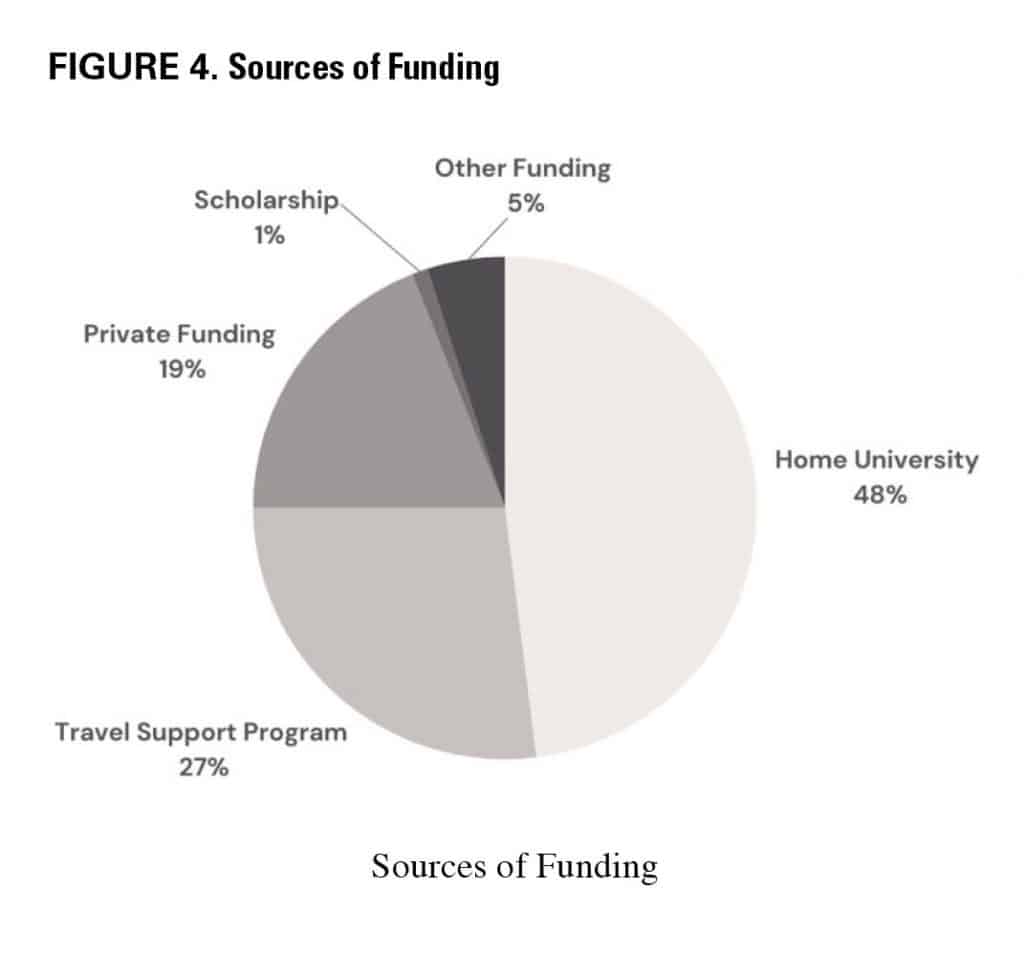
The “Beds for Brains” program, which was designed to provide housing for participants, involved 25 individuals. All respondents who participated in this program rated the accommodations provided and the experience as good/very good, indicating a high level of satisfaction with this initiative.
Participants were asked to evaluate their personal experience and the impact of the congress on their development (see Figure 5). All respondents agreed/fully agreed that they felt able to meet the requirements of the congress and that the congress increased their confidence in presenting their research in public (95 percent). Similarly, 92 percent agreed/fully agreed that the congress increased their confidence in expressing their opinions about other research projects. In addition, 87 percent of respondents agreed/fully agreed that the congress provided them with new perspectives on their own research topic. In terms of future aspirations, 82 percent agreed/fully agreed that the Congress increased their interest in pursuing a professional career in research. The Congress was very effective in facilitating interaction among participants, with 92 percent agreeing/fully agreeing that they were able to exchange ideas about their research with fellow students, colleagues, and other researchers. In addition, 72 percent agreed/fully agreed that they made contacts for future research projects during the congress. The congress was praised for its pleasant atmosphere, with all respondents agreeing with this statement. Participants acknowledged the impact of the congress on their perception of themselves as researchers (90 percent) and on their research and careers (95 percent). Overall, all respondents agreed/fully agreed that they would recommend the congress to other students.
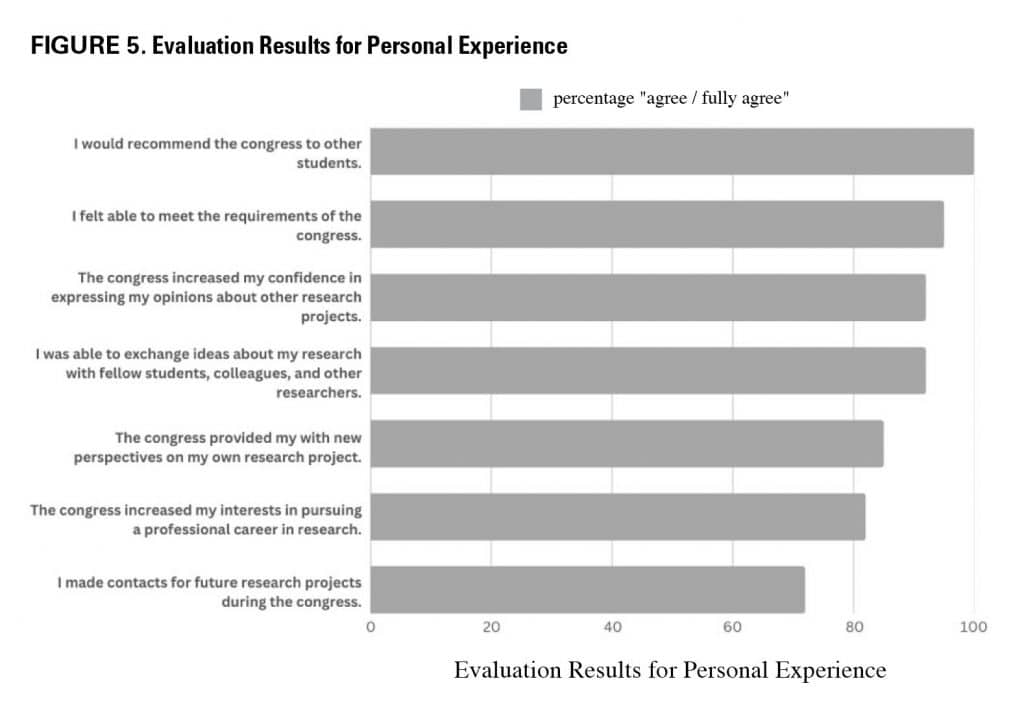
Critical Comments
The organizing team acknowledged the critical comments received from attendees, which were highly appreciated for their constructive nature. Feedback included suggestions for improving the clarity of the website, improving the food experience at the congress party, addressing concerns about the crowded and short duration of the poster sessions, facilitating student access to the faculty poster session, optimizing the length of the opening and closing ceremonies, ensuring transparency in the awards process, addressing the perceived excess of “giveaways” e.g., lanyards or notebooks, and exploring options such as an online abstract book or mobile app for comprehensive information. Thematic sessions received both positive feedback, with attendees considering them the best part of the congress, and negative feedback regarding the sessions perceived as too strictly structured. Participants expressed a desire for more networking opportunities for faculty and coordinators, and inquired about the possibility of sharing contact information for student presenters. While the atmosphere of the congress was generally praised, some attendees felt that networking at the event felt forced. The social program, especially the day tours, received positive feedback for its integration into the official program. A third of the respondents felt that there was sometimes too little information provided on certain topics in advance. This feedback highlights the importance of comprehensive and timely communication to ensure that attendees are well informed and prepared for the event.
The evaluation results and participant feedback provided valuable insights for improving future iterations of the World Congress on Undergraduate Research. The constructive criticism received was appreciated and will be considered to improve various aspects of the Congress, ensuring an even more enriching experience for participants.
Conclusion
The 2nd World Congress witnessed significant growth in both the number of students participating and the countries represented. A notable innovation was the introduction of support programs tailored to facilitate the engagement of students from low-income countries. This furthered the goal of the Congress to bring together students of different nationalities and research disciplines. At the same time, this diversity served as a collective force to address global challenges – the second goal of the congress – through the cultivation of global networks and the collaborative exploration and discussion of potential solutions.
Students played a central role in the event’s development and organization, particularly taking the lead in various aspects of the program, including the social program. This active involvement underscored the commitment and dedication of the student community in shaping and contributing to the success of the 2nd World Congress on Undergraduate Research. This was continued by the 3rd World Congress.
The review of the experiences and the results of the evaluation led to the meticulous preparation of a comprehensive 29-page document that served as a valuable resource for the subsequent organizers of the 3rd World Congress on Undergraduate Research. This document provides detailed recommendations derived from lessons learned in planning and executing the 2nd World Congress components, including insights into the implementation of social programs, the necessity of travel support programs, the effectiveness of the “Beds for Brains” initiative, the pivotal role of an engaged student team, the importance of cultivating a reliable network of scientists, and the strategic use of early promotional tactics and social media activation. This documentation will be further developed by future hosts of the congress to continuously facilitate the organization of the event and improve the experience of future attendees.
Several major organizational priorities utilized at the 2nd World Congress were adapted by the 3rd World Congress. Timely communication of important information (e.g., congress schedule) was even more important than we had anticipated and was improved for the third edition. The visual presentation of the event and of the research themes, which was provided by the organizing team itself in Oldenburg, has played an important role in students’ identification with the event and their contribution. For the third WorldCUR in Warwick, this aspect was given much more attention and very appealing logos and icons were developed for the congress and the research themes.
Also, the success of the thematic sessions was developed into the International Student Research Projects (ISRP), which brought together students from various institutions to work virtually on joint research projects prior to the congress.
Finally, the approach of supporting students from low-income countries was continued, although this was much more difficult during the pandemic than in 2019. As a result, the third edition was even more diverse than the second, despite the after-effects of the pandemic (e.g., less support for students from their own universities), which the event still had to manage.
Data Availability
The data used in this paper are openly available to the public at World CUR2019 Evaluation Detailed Results: https://uol.de/fileadmin/user_upload/lehre/flif/WCUR2019/WorldCUR2019_Evaluation_Results.pdf?v=1563892945.
Institutional or Ethical Review Board
The article deals with the ideas behind the second iteration of the World Congress on Undergraduate Research, the challenges in organizing it, and the results of the evaluation of the congress, and does not include research involving human subjects.
Conflict of Interest Statement
All authors declare that they have no conflicts of interest.
References
Haberstroh, Susanne, and Pelle Bernhold, eds. 2021. “WorldCUR 2019”. Special Issue, forsch! no. 1 (December 2021) Accessed August 15, 2023. https://ojs.uni-oldenburg.de/journals/ojs1/ojs/index.php/forsch/issue/view/1
Hill, Jennifer, and Helen Walkington. 2016. “Developing Graduate Attributes through Participation in Undergraduate Research Conferences.” Journal of Geography in Higher Education 40: 222–237. doi: 10.1080/03098265.2016.1140128
Kneale, Pauline, Andrew Jones, Helen Walkington, and Jennifer Hill. 2016. “Evaluating Undergraduate Research Conferences as Vehicles for Novice Researcher Development.” International Journal for Researcher Development 7: 159–177. doi: 10.1108/ijrd-10-2015-0026
Little, Chris. 2020. “Undergraduate research as a student engagement springboard: Exploring the longer-term reported benefits of participation in a research conference.” Educational Research 62 (2): 229–245. doi: 10.1080/00131881.2020.1747360
Mabrouk, Patricia Ann. 2009. “Survey Study Investigating the Significance of Conference Participation to Undergraduate Research Students.” Journal of Chemical Education 86: 1335–1340. doi: 10.1021/ed086p1335
Rivera, Julio, Maher Khelifa, Bushra Abu Hamdah, Aisha Mohammed Al-Hamadi, and Emma S. Zdgiebloski. 2018. “A Global Conversation: Reflections from the First World Congress on Undergraduate Research.” SPUR 2(1): 55–59. doi:10.18833/spur/2/1/4.
University of Oldenburg. n.d.a. “Congress Impressions”. Accessed August 22, 2023. https://uol.de/en/worldcur2019/congress-impressions
University of Oldenburg. n.d.b. “Profile of the university”. Accessed August 28, 2023. https://uol.de/en/outline
University of Oldenburg. n.d.c. “Research Themes”. Accessed March 10, 2023. https://uol.de/en/worldcur2019/archiveworldcur2019/research-themes
University of Oldenburg. n.d.d. “Travel & Visa”. Accessed March 10, 2023. https://uol.de/en/worldcur2019/archiveworldcur2019/travel-visa
University of Oldenburg. 2019a. “Abstract Book.” Accessed August 15, 2023. https://uol.de/fileadmin/user_upload/lehre/flif/WCUR2019/World_CUR_2019_-_Abstract_Book.pdf?v=1558710988
University of Oldenburg. 2019b. “Congress Booklet.” Accessed August 15, 2023. https://uol.de/fileadmin/user_upload/lehre/flif/WCUR2019/World_CUR_2019_-_Congress_Booklet.pdf?v=1557762931
University of Oldenburg. 2019c. “Looking Back. Congress Impressions and Facts.” Accessed August 15, 2023. https://uol.de/fileadmin/user_upload/lehre/flif/WCUR2019/World_CUR_2019-Retrospect_web.pdf?v=1571934354
University of Oldenburg. 2019d. “World CUR2019 Evaluation Detailed Results”. Accessed August 15, 2023. https://uol.de/fileadmin/user_upload/lehre/flif/WCUR2019/WorldCUR2019_Evaluation_Results.pdf?v=1563892945
WorldCUR2019. n.d. Accessed August 15, 2023. https://www.youtube.com/@WorldCUR
WorldCUR. 2019. “WorldCUR2019.” Accessed October 21, 2019. https://www.youtube.com/watch?v=IAqKIkUc6A8&t=1s
Vanessa Barbagiovanni Bugiacca
University of Oldenburg, vanessa.barbagiovanni.bugiacca@uni-oldenburg.de
Vanessa Barbagiovanni Bugiacca is a member of the editorial staff of forsch!, the online student journal of the University of Oldenburg (Germany). As a member of the congress team for the 2nd World Congress on Undergraduate Research, hosted by the University of Oldenburg in 2019, she was responsible for the preparation of the conference proceedings and subsequent publications. She holds an MA in Cultural Studies and a BA in English and Cultural Studies, both from the University of Oldenburg.
Annalena Karweik has been coordinator of the research-based learning grant program, based at the Presidential Department for Study Affairs of the University of Oldenburg (Germany), since 2021. The program includes grants for instructional and student research projects, as well as funding for participation in conferences or material costs for implementing student projects. In 2019, she was a member of the congress team for the 2nd World Congress on Undergraduate Research, held at the University of Oldenburg.
Susanne Haberstroh is deputy head of the Presidential Department for Study Affairs at the University of Oldenburg (Germany), where she is responsible for the implementation of research-based learning with a focus on the publication of student research results. She is the initiator of the annual German Student Conferences, which took place for the first time in Oldenburg in 2016. In 2019, she hosted the 2nd World Congress on Undergraduate Research at the University of Oldenburg.
More Articles in this Issue
No posts found
